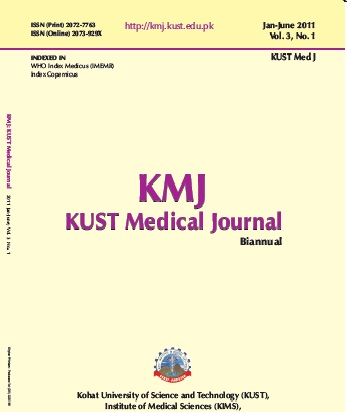Correlation between psychosocial issues and noncompliance in spinal Orthosis in patients with adolescent idiopathic scoliosis
Main Article Content
Abstract
ABSTRACT
Objectives:
The aim of this study was to find a correlation between psychosocial issues and noncompliance in spinal orthosis, in patients with adolescent idiopathic scoliosis.
Material and Methods:
This study was conducted at PIPOS, Pakistan Institute of Prosthetic and Orthotic Sciences, Peshawar-Pakistan from October, 2008 to Feb: 2009. The brace questionnaire (BrQ) was used to collect the quantitative data. All the questions were answered according to the likert scale in the following five responses, “Always”, “Most of the times”, “Some times”, “Almost Never” and “Never”. Descriptive statistical analyses were done and a correlation coefficient test was applied to get the results.
Results:
The total numbers of participants were 11 (04 boys and 07 girls) with mean age of 11 + 3.59 years (range 5 to 17). The average negative psychosocial was 52.4% + 10.5%. A strong correlation of 0.8462 was found between noncompliance and the psychosocial issues in clients with spinal orthosis.
Conclusion:
The difference in results of this study to previously published material may be due to the different demographics and culture in which the study was performed. Psychosocial counseling of adolescents with AIS along with orthotic treatment may improve compliance and therefore, the outcome.
Key words:
Spinal Orthosis (SO), Adolescent idiopathic scoliosis (AIS), noncompliance, psychosocial issues
Article Details
Work published in KMUJ is licensed under a
Creative Commons Attribution 4.0 License
Authors are permitted and encouraged to post their work online (e.g., in institutional repositories or on their website) prior to and during the submission process, as it can lead to productive exchanges, as well as earlier and greater citation of published work.
(e.g., in institutional repositories or on their website) prior to and during the submission process, as it can lead to productive exchanges, as well as earlier and greater citation of published work.
